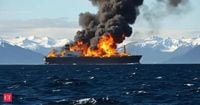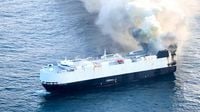In a dramatic incident unfolding in the North Pacific, the cargo ship Morning Midas, carrying over 3,000 vehicles including dozens of electric and hybrid models, caught fire roughly 300 miles southwest of Adak Island, Alaska. The blaze, which started on June 3, 2025, forced the 22 crew members to abandon ship after their efforts to control the fire with onboard suppression systems failed.
The Morning Midas, a 600-foot (183-meter) car and truck carrier sailing under a Liberian flag and managed by London-based Zodiac Maritime, departed from Yantai, China, on May 26, 2025. The ship was en route to Lázaro Cárdenas, a major Pacific port in Mexico, carrying a cargo of 3,048 vehicles. Among these were 70 fully electric vehicles and 681 hybrid electric vehicles, reflecting the growing trend of EV shipments across the globe.
According to the U.S. Coast Guard, a large plume of smoke was first spotted emanating from the ship’s stern, specifically from the deck loaded with electric vehicles, on the evening of June 3. The crew immediately initiated emergency firefighting procedures using the ship’s CO2 fire suppression system. However, the fire proved stubborn, reigniting after the suppression system was exhausted—a characteristic behavior of lithium-ion battery fires, which are notoriously difficult to extinguish.
Sean DeCrane, director of the International Association of Fire Fighters, explained that the fire aboard the Morning Midas "appears consistent with known electric vehicle ignition behavior, especially in cases where CO2 systems are involved." Lithium-ion battery fires burn at extremely high temperatures, release toxic gases, and can reignite even after being suppressed. Furthermore, the marine environment exacerbates the risks, as saltwater corrosion can destabilize battery packs, making firefighting efforts even more complex.
Despite the crew’s valiant efforts, the fire could not be brought under control. Consequently, the 22 crew members evacuated the vessel by lifeboat and were rescued without injury by the crew of the nearby merchant vessel Cosco Hellas. The U.S. Coast Guard dispatched aircraft and diverted the cutter Munro to assist, while three other commercial ships responded to the distress call, underscoring the collaborative maritime spirit in emergencies.
Rear Admiral Megan Dean, commander of the Coast Guard’s Seventeenth District, praised the heroic actions of the rescuers, stating, "We are grateful for the selfless actions of the three nearby vessels who assisted in the response and the crew of motor vessel Cosco Hellas, who helped save 22 lives." She added that while the search and rescue phase concluded successfully, efforts are ongoing to determine how to recover the ship and manage the aftermath of the fire.
The Morning Midas carries approximately 350 metric tons of gas fuel and 1,530 metric tons of very low sulfur fuel oil, adding urgency to the containment and salvage operations to prevent environmental damage. Zodiac Maritime confirmed that they are working closely with emergency responders and a tugboat has been deployed to support firefighting and salvage.
This incident echoes previous maritime disasters involving electric vehicles. In 2022, the Felicity Ace, a Panama-flagged car carrier loaded with nearly 4,000 vehicles including EVs from luxury brands such as Porsche and Lamborghini, burned uncontrollably for nearly two weeks in the Atlantic before sinking near the Azores. The financial loss was staggering, with Volkswagen Group estimating insurance claims exceeding $155 million. Similarly, in 2023, the Fremantle Highway car carrier suffered a fire, though the electric vehicles on board were stored separately and salvaged successfully.
These events have ignited debates within shipping and insurance industries about the risks of transporting EVs by sea. Some companies, like Norway’s Havila Kystruten, have refused to carry electric vehicles citing high risk, while Chinese automakers such as SAIC Motors and BYD have begun operating their own fleets of car carriers, possibly to better manage these risks.
The challenges posed by lithium-ion battery fires are significant. The Environmental Protection Agency warns that even used or damaged lithium-ion batteries can ignite, release toxic gases, or explode—risks heightened in marine and high-temperature environments. Fire suppression systems commonly used on ships, such as CO2, are ineffective against these fires, which often require large volumes of water to cool the battery cells. However, carrying vast amounts of water on board is impractical, and seawater use is limited due to its corrosive effects on ship systems.
As electric vehicles continue to gain market share—China alone accounts for over 60% of EV sales in Mexico—the transportation of these vehicles by sea is set to increase. With more than 80% of international trade by volume arriving via sea, and the largest container ships stretching longer than three football fields, the maritime industry faces a pressing need to develop improved safety protocols and emergency responses tailored to the unique hazards of EV cargo.
Earlier this year, a Dutch safety board called for enhanced emergency response measures on North Sea shipping routes following a deadly 2023 fire on a freighter carrying nearly 3,000 automobiles, including about 500 electric vehicles. That fire resulted in one fatality, multiple injuries, and a week-long blaze that required towing the ship for salvage. Such incidents highlight the growing urgency to address the safety challenges posed by the increasing presence of lithium-ion batteries on cargo ships.
The Morning Midas, built in 2006, now remains adrift with smoke still billowing from its decks as of June 4, 2025. The investigation into the fire’s cause is ongoing, with authorities and the ship’s operator working to mitigate environmental risks and plan salvage operations. The incident serves as a stark reminder of the evolving complexities in maritime shipping as global trade adapts to new technologies and environmental imperatives.
For now, the safe rescue of the crew offers a silver lining amid the uncertainty surrounding the fate of the Morning Midas and its cargo. The maritime community watches closely as this latest chapter in the challenges of transporting electric vehicles unfolds on the high seas.


